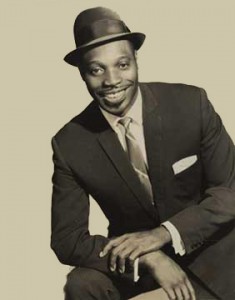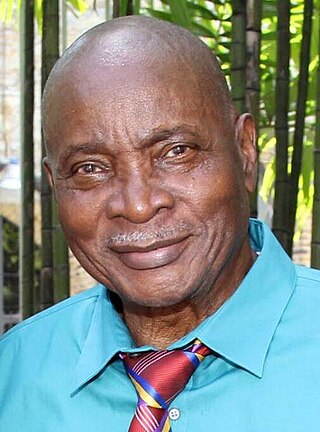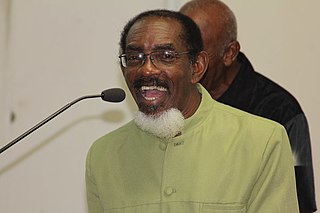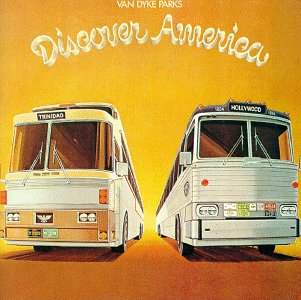Related Research Articles
Soca music is a genre of music defined by Lord Shorty, its inventor, as the "Soul of Calypso", which has influences of African and East Indian rhythms. It was originally spelled "sokah" by its inventor but through an error in a local newspaper when reporting on the new music it was erroneously spelled "soca"; Lord Shorty confirmed the error but chose to leave it that way to avoid confusion. It is a genre of music that originated in Trinidad and Tobago in the early 1970s and developed into a range of styles during the 1980s and after. Soca was initially developed by Lord Shorty in an effort to revive traditional calypso, the popularity of which had been flagging amongst younger generations in Trinidad due to the rise in popularity of reggae from Jamaica and soul and funk from the United States. Soca is an offshoot of calypso/kaiso, with influences from East Indian rhythms and hooks.
Calypso is a style of Caribbean music that originated in Trinidad and Tobago during the early to mid-19th century and spread to the rest of the Caribbean Antilles by the mid-20th century. Its rhythms can be traced back to West African Kaiso and the arrival of French planters and their slaves from the French Antilles in the 18th century.

Lord Invader was a prominent calypsonian with a very distinctive, gravelly voice.

Lord Melody was a popular Trinidadian calypsonian, best known for singles such as "Boo Boo Man", "Creature From The Black Lagoon", "Shame & Scandal", "Jonah and the Bake", "Juanita", and "Rastaman Be Careful". Melody's career spanned forty years, from the beginnings of popular calypso music to his embrace of the more dance oriented Soca style by the late 1970s.

Aldwyn Roberts HBM DA, better known by the stage name Lord Kitchener, was a Trinidadian calypsonian. He has been described as "the grand master of calypso" and "the greatest calypsonian of the post-war age".

Slinger Francisco ORTT CM OBE, better known as Mighty Sparrow, is a Trinidadian calypso vocalist, songwriter, and guitarist. Known as the "Calypso King of the World", he is one of the best-known and most successful calypsonians. He has won Trinidad's Carnival Road March competition eight times, Calypso King/Monarch eight times, and has twice won the Calypso King of Kings title.
The music of Trinidad and Tobago is best known for its calypso music, soca music, chutney music, and steelpan. Calypso's internationally noted performances in the 1950s from native artists such as Lord Melody, Lord Kitchener and Mighty Sparrow. The art form was most popularised at that time by Harry Belafonte. Along with folk songs and African- and Indian-based classical forms, cross-cultural interactions have produced other indigenous forms of music including soca, rapso, parang, chutney, and other derivative and fusion styles. There are also local communities which practice and experiment with international classical and pop music, often fusing them with local steelpan instruments.

A calypsonian, originally known as a chantwell, is a musician from the anglophone Caribbean who sings songs of the calypso genre.
"Rum and Coca-Cola" is a popular calypso song composed by Lionel Belasco with lyrics by Lord Invader. The song was copyrighted in the United States by entertainer Morey Amsterdam and was a hit in 1945 for the Andrews Sisters.
Byron Lee and the Dragonaires are a Jamaican ska, calypso and soca band. The band played a crucial pioneering role in bringing Caribbean music to the world. Byron Lee died on 4 November 2008, after suffering from cancer for a sustained period.

Calypso Rose or Linda McCartha Monica Sandy-Lewis is a Trinidadian calypsonian. She started writing songs at the age of 13; over the years, she has composed more than 1000 songs and recorded more than 20 albums. Considered the "mother of calypso", Rose was the first female calypso star and her lyrics frequently address social issues like racism and sexism. Her influence over the calypso music genre forced the renaming of the Calypso King competition to the Calypso Monarch instead. In addition to writing songs about social issues, Rose is also an activist and was given the title of UNICEF Goodwill Ambassador for former child soldiers along with performing at numerous events for social change. She has received every award available to living artists in the Caribbean.

Hollis Urban Lester Liverpool, better known as Chalkdust or Chalkie, is a leading calypsonian from Trinidad and Tobago. He has been singing calypso since 1967 and has recorded more than 300 calypsos.

Discover America is the second album by American recording artist Van Dyke Parks, released in May 1972 by Warner Bros. Its sound is a major departure from his debut album, Song Cycle (1967), featuring all cover versions of previously written songs.
The Calypso Monarch contest is one of the two major annual calypso competitions held in Trinidad and all English speaking Caribbean islands, as part of the annual carnival celebrations.
Sandra DesVignes-Millington, better known as Singing Sandra, was a Trinidadian calypsonian who won the Calypso Monarch title at the 1999 and 2003 carnivals.
Gordon Rohlehr was a Guyana-born scholar and critic of West Indian literature, noted for his study of popular culture in the Caribbean, including oral poetry, calypso and cricket. He pioneered the academic and intellectual study of Calypso, tracing its history over several centuries, writing a landmark work entitled Calypso and Society in Pre-Independence Trinidad (1989), and is considered the world's leading authority on its development.

Winsford Devine, known by the sobriquet Joker, was a Trinidad and Tobago songwriter who composed over 500 calypsos. He worked with The Mighty Sparrow for 17 years, writing many of Sparrow's hits including Slave, Philip, My Dear, and Marajhin. Devine was also the composer of Progress which has been ranked among the best calypsos ever.
Rufus Callender (1910–1976), better known as Lord Caresser, was a Trinidadian calypsonian. He is best known for his 1937 recording of "Edward the VIII", a calypso about the 1936 Abdication of Edward VIII of England. This was one of the best-selling records in the golden age of calypso of the 1930s and early 1940s, and generated further hits for Jamaican singer Lord Flea and American singer Harry Belafonte when they covered it in the 1950s.
Clifton Ryan, better known as the Mighty Bomber, was a Grenadian-born calypsonian from Trinidad and Tobago.
References
- ↑ Kevin K. Birth (2008). Bacchanalian sentiments: musical experiences and political counterpoints in Trinidad. Duke University Press. ISBN 978-0-8223-4165-9.